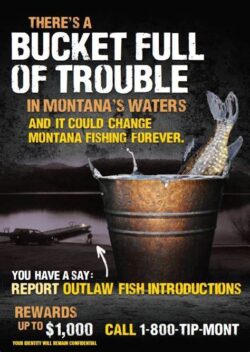
Pet fish are finding their way into our wild fisheries. Sadly, it’s becoming more common to catch huge Goldfish, Tilapia, Plecostomus/invasive catfish, and other non-natural species in our once healthy ecosystems.
Montanans have been hit hard by these nonnative unwelcomed finny invaders.
Yellowstone Lake has become overrun with non-natural Lake Trout.
The Yellowstone River has smallmouth moving into waters near the park.
Canyon Ferry was supposed to be managed for a trout fishery but now is infested with walleye and pike.
Rainbow, Brown, Lake, Brook trout are all introduced as non-native species. The only native and wild trout found in Montana are cutthroat and bull trout.
Walleye, bass, perch, crappie, pike, bullhead catfish, lake whitefish, Kokanee, are all introduced species. These sports fish can be fine when left and managed in environments where they do not impact other native, wild species. Smart Biology needs to be left to the professionals.
Bucket Biologists are responsible for many of these invasive fishery problems. Some folks, that think they know best, introduce fish from one place to another. The lake trout in Yellowstone Park show the same DNA as the ones in Lewis Lake, but no natural watershed allows lake trout to make the journey. Apparently, lake trout were caught at Lewis Lake and placed into a bucket, then transported, and released to Yellowstone Lake. Lakers feast on the native Cutthroats. There are no natural predators to feed on the lakers. It has taken decades and millions of dollars to manage the damage. Moving a fish species to waters closer to where people want them is not a choice for non-biologists to make.
Recently a 67 lb. pet goldfish was caught in a community lake. This feral fish was once someone’s pet fish. When the pet owner moved or was done with caring for a fish tank, the goldfish was set free. Goldfish can grow to gigantic proportions depending upon their environment. Some fishermen use goldfish for bait, thinking that they should make great, attractive fish bait. Koi are too common in many local community ponds. Other pet catfish, snakeheads, and cichlids have also been found in once wild waters.
Nature knows best! Natural ecosystems are fragile and can be quickly damaged or destroyed through ignorance and carelessness. Asian carp have invaded the Mississippi River and tributaries. These fish were being raised in farm ponds for Asian restaurants until flooding allowed them to escape. WE have all seen the videos of these jumping and leaping fish when motorboats scare them.
Nonnative fish feed on the offspring of native fish. They may also feast on insects and other habitat needs. The natural balance is thrown off just like when a fox is allowed into a chicken coop. Invaders include pigs, snakes, shellfish, crayfish, insects, diseases, birds, and everything that was supposed to live in other places, The world has become a smaller place and natural barriers are not enough to preserve natural species. It may not be possible to prevent all feral incursions, but we can prevent many of them.
One of the latest feral risks is happening from raising commercial salmon and other fish in floating net pens. Nets break, fish jump, and the damage is quickly done. Inferior genetics in farm raised fish can contaminate wild DNA. The result is unhealthy and less strong fish.
Nature determines healthy populations through survival of the fittest. Certain species live, feed, and breed in ecosystems best for their survival. The food chain keeps populations in balance. When a predator is released into an environment where nothing feeds on them, they can destroy the ecosystem populations.
If you see Feral Fish being transported, contact your local fishery agency, and report them.
Keep our wild fish healthy and happy!
Montana Grant




